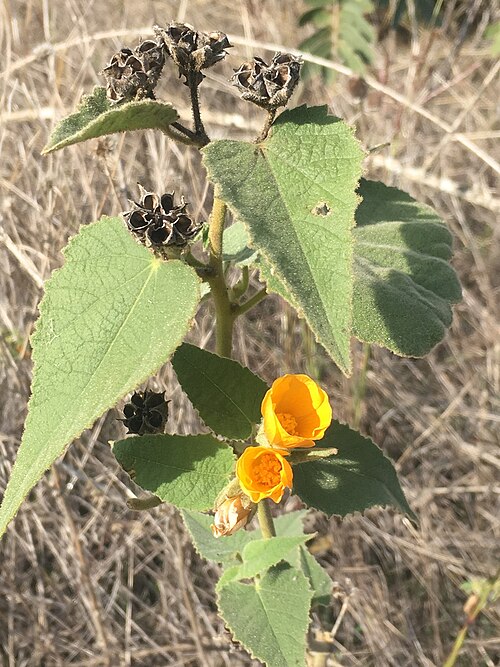Chisos Mountain False Indianmallow: A Hidden Gem for Desert Gardens
Meet one of the Southwest’s best-kept gardening secrets: the Chisos Mountain false Indianmallow (Allowissadula holosericea). This charming native perennial might have a mouthful of a name, but don’t let that intimidate you. Once you get to know this delightful desert dweller, you’ll wonder why more gardeners aren’t singing its praises.
What Exactly Is Chisos Mountain False Indianmallow?
This lovely plant is a perennial forb—essentially a non-woody flowering plant that comes back year after year. As a member of the mallow family, it shares some family traits with hibiscus and cotton, though it’s much more modest in size and demeanor. The plant produces small, cheerful yellow-orange flowers that look like tiny hibiscus blooms, set against heart-shaped leaves with a soft, velvety texture that practically begs to be touched.
You might occasionally see this plant listed under its former scientific names, including Abutilon marshii or Wissadula holosericea, but Allowissadula holosericea is the current accepted name.
Where Does It Call Home?
This native beauty hails from a very specific corner of the American Southwest. You’ll find it naturally growing in New Mexico and Texas, particularly in the Chihuahuan Desert region around Big Bend. It’s named after the Chisos Mountains, where it thrives in the rocky, arid landscape that would challenge many other plants.
Why Your Garden (Might) Want This Plant
Here’s where things get interesting. Chisos Mountain false Indianmallow isn’t for every garden or every gardener, but for the right situation, it’s absolutely perfect:
- Ultimate drought tolerance: Once established, this plant laughs in the face of dry spells
- Pollinator magnet: Native bees and butterflies adore the small but abundant flowers
- Low maintenance: Perfect for gardeners who want beauty without the fuss
- True native credentials: Supporting local ecosystems while reducing water usage
- Unique texture: The velvety leaves add interesting tactile appeal to garden beds
The Reality Check: Is This Plant Right for You?
Let’s be honest—this isn’t a plant for everyone. If you’re gardening outside of USDA hardiness zones 8-10, you’ll likely struggle to keep it happy. It’s also not the showstopper that some gardeners crave. The flowers, while charming, are relatively small and subtle. This is more of a quiet beauty than a look at me plant.
It’s best suited for:
- Desert and xeric gardens
- Native plant enthusiasts
- Low-water landscaping projects
- Naturalized areas where it can spread and self-seed
- Gardens in its native range of Texas and New Mexico
Growing Your Chisos Mountain False Indianmallow
The good news? This plant is refreshingly easy to grow if you can provide what it wants: sunshine and good drainage. Here’s your success roadmap:
Location and Soil
Plant in full sun—this desert native needs at least 6-8 hours of direct sunlight daily. The soil should drain well; soggy conditions are the quickest way to lose this plant. Sandy or rocky soil that mimics its native habitat works beautifully.
Watering Wisdom
Water regularly during the first growing season to help establish roots, then back off significantly. Once established, natural rainfall should be sufficient in most areas. When in doubt, err on the side of too dry rather than too wet.
Maintenance
This is where Chisos Mountain false Indianmallow really shines—it needs very little from you. No regular fertilizing, no frequent pruning, no fussing. You might deadhead spent flowers if you want to prevent self-seeding, but many gardeners enjoy letting it naturalize.
The Bottom Line
Chisos Mountain false Indianmallow is a specialist plant for specific conditions and gardeners. If you’re creating a water-wise landscape in the Southwest, supporting native pollinators, or simply love the quiet charm of desert wildflowers, this could be your new favorite plant. However, if you’re looking for bold color, need something for a shady spot, or garden in cooler climates, you might want to explore other options.
For the right gardener in the right place, though, this native gem offers years of low-maintenance beauty and the satisfaction of supporting local ecosystems—and really, what more could you ask for?



